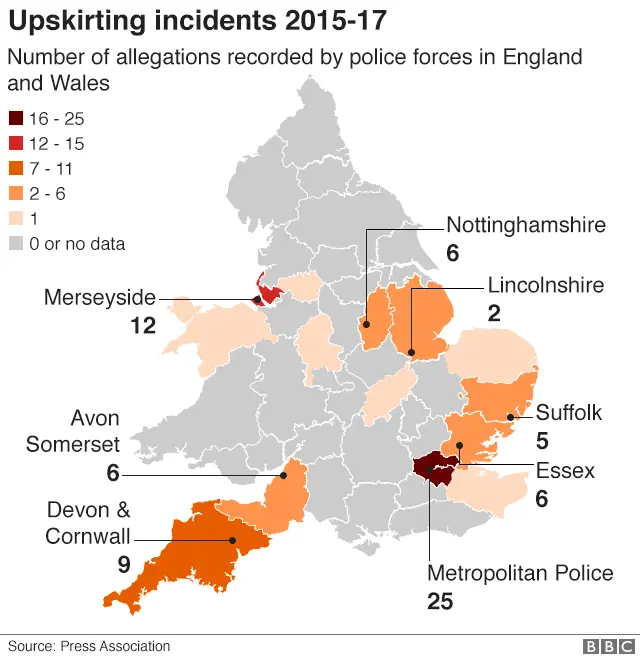'Upskirting' should be criminal offence, campaigners say
"Upskirting" should be made a specific sexual offence, after police data showed a 10-year-old girl was among those targeted, campaigners say.
Secretly photographing underneath a skirt is not a specific offence in England and Wales.
The Ministry of Justice says that upskirting is currently covered by alternative avenues of prosecution.
There have been just 11 charges related to the practice since 2015, a Freedom of Information request found.
The FoI request, made by the Press Association, found only 15 out of 44 police forces contacted held records - a situation campaigners describe as "wholly inadequate".
Upskirting has been an offence in Scotland since 2010 when it was listed under the broadened definition of voyeurism.
A day after the department said the law on upskirting was "under constant review", an MoJ spokesman said that, as powers to enable prosecutions "already exist", a change in law was not needed.
In a statement, the MoJ said it was "up to prosecutors to decide if there is sufficient evidence for them to move forward, the issue is not with the laws in place."
MP Maria Miller, who chairs the Commons' women and equalities select committee, said more must be done to stop a "horrific crime" and that a stronger legal framework "can help" begin to tackle it.
She said: "Attempting to take a photograph underneath a skirt is a gross violation of privacy and potentially an act of indecency".
Insufficient evidence
As there is no law specifically naming and banning upskirting, victims and police are presently only able to pursue offences of voyeurism or indecency.
The FoI request found the police pursued 78 offences related to upskirting since 2015, but only 11 led to alleged offenders being charged.
There was insufficient evidence to proceed in several cases, including in regard to an alleged sexual offence on a 10-year-old girl in 2015, Avon and Somerset Police said.
Upskirting took place in a wide variety of public spaces, including nightclubs, shops and restaurants - with mobile phones frequently used and young women disproportionately targeted.

Upskirting allegations by police forces
- Devon and Cornwall - alleged offences included taking an indecent photograph of a child, voyeurism and conspiring to outrage public decency. One victim said she turned around to see an offender bent over on the floor with his camera up her skirt. Five people were charged. The known victims aged from 25 to 47.
- Lincolnshire - one alleged offence involved a man seen on CCTV taking pictures up women's skirts without their knowledge. Another man was spotted by security staff at a McDonald's restaurant at Cornhill, Lincoln, lying under the stairs and looking up "young girls' skirts".
- Nottingham - of the six reported incidents, two resulted in criminal charges. In one case, a man was seen following a woman around a shop, and taking a picture up her skirt when she approached the checkout.

Clare McGlynn, professor of law at Durham University and an expert on sexual violence, said the FoI data showed there "are few public places where women are free from this abuse".
She said: "The government's continuing failure to provide an effective criminal law against upskirting breaches women's human rights."
She added women were entitled to protection, privacy and "a law that is fit for purpose", by treating the act as sexual abuse.
"Only then will victims feel more willing to come forward and report to the police and support prosecutions," she said.


What are the limitations of the current law? by BBC Reality Check
- Voyeurism only applies to filming actions taking place in private
- Outraging public decency usually requires someone to have witnessed the action but upskirting is often unobserved
- It may be only discovered later because footage ends up on the internet
- It also has to take place in public - some spaces like schools might not count as public
- Unlike other sexual offences, people don't have automatic right to anonymity

Campaigners say the current situation resembles that of revenge porn: the practice of posting online explicit material without the subject's consent, which was only made illegal in April 2015, after a national campaign.
They argue the ambiguity surrounding upskirting is similar, and that a specific offence needs to be created so the police can pursue more cases.


Sarah Green, for the End Violence Against Women coalition, described the police figures as "very concerning, even though only a minority of police forces were able to respond because the behaviour is not classified as an offence".
She said: "The police responses show that the police are clearly struggling to recognise upskirting distinctly, even though the disclosures reveal that it is commonly connected to existing sexual offences including voyeurism and sexual assault.
"It is notable that girls and young women are disproportionately targeted where that information has been recorded. The law should be urgently examined in this area."
